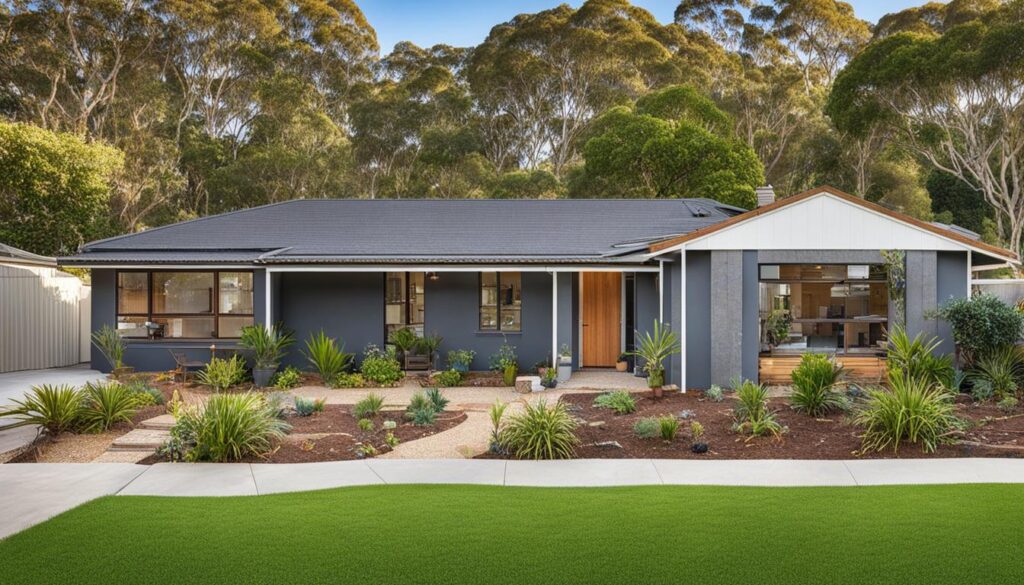No products in the cart.
Brisbane, Gold Coast, Melbourne, Sydney
Renovations in Australia
According to the latest research report from Houzz, renovations in Australia have reached a significant milestone. In 2021, nearly half of homeowners (48%) decided to renovate their homes, resulting in a remarkable 43% increase in median renovation spend. This trend is expected to continue in 2022, with approximately 49% of homeowners planning renovations and a higher planned spend of $25,000. The demand for specialty service providers like electricians and plumbers has also surged as homeowners seek professional assistance for their renovation projects.
Key Takeaways:
- Renovation activity and spend in Australia have reached a three-year high.
- Nearly half of homeowners (48%) renovated their homes in 2021, with a significant increase in median renovation spend.
- In 2022, approximately 49% of homeowners are planning renovations, with a higher planned spend of $25,000.
- Specialty service providers like electricians and plumbers are in high demand for renovation projects.
- The surge in renovations reflects the desire of homeowners to improve their living spaces and increase property value.
Renovation Trends in 2022
When it comes to renovations in Australia, homeowners are following the latest trends to transform their living spaces. In 2022, the focus is on interior room renovations, with kitchens taking the spotlight as the most popular and highest-spending room to upgrade. This comes as no surprise, as the kitchen is often considered the heart of the home and a space where functionality and aesthetics play a crucial role.
But kitchens aren’t the only rooms getting attention. Other interior spaces that saw a surge in popularity in 2021 include guest bedrooms, guest bathrooms, entry or mudrooms, and wardrobes. Homeowners are recognizing the importance of creating functional and visually appealing areas throughout their homes. By renovating these spaces, they can enhance the overall functionality and ambiance of their living environment.
With a focus on interior room renovations, homeowners in Australia are embracing the opportunity to transform key areas of their homes in 2022. By investing in kitchen upgrades and renovating other interior spaces, they can create functional and aesthetically pleasing environments that cater to their unique needs and preferences.
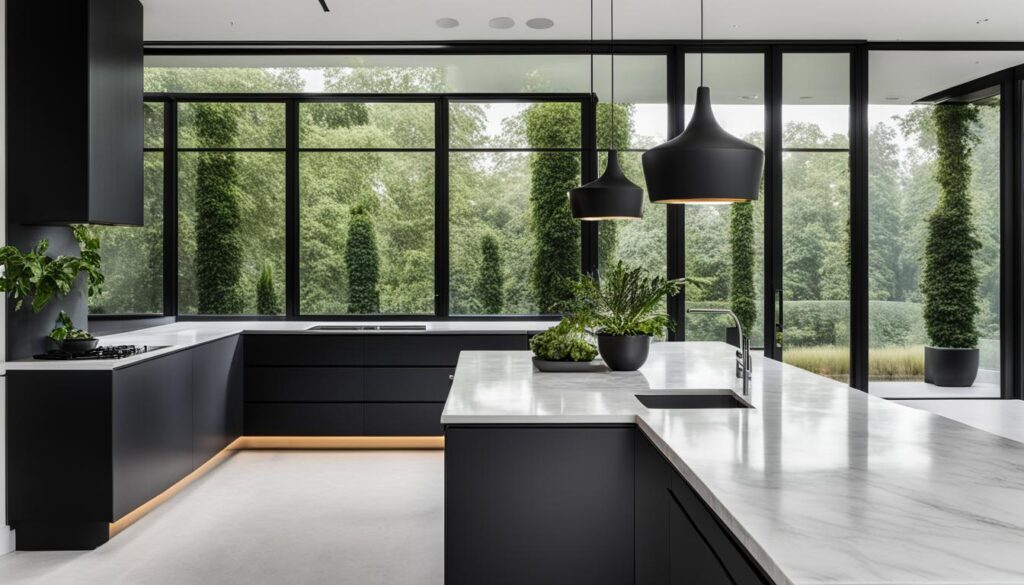
| Room | Popular Renovation Trends |
|---|---|
| Kitchen | High-quality appliances, smart storage solutions, open shelving, and natural materials. |
| Guest Bedroom | Luxurious bedding, cozy lighting, and personalized decor to create a welcoming retreat for guests. |
| Guest Bathroom | Spa-like features, such as rainfall showers, freestanding tubs, and modern fixtures. |
| Entry or Mudroom | Organizational systems, built-in storage, and durable flooring for a practical and stylish entrance. |
| Wardrobe | Customized storage solutions, integrated lighting, and space-efficient designs. |
The Importance of Energy Efficiency in Renovations
When it comes to renovations, energy efficiency should be a top priority for homeowners in Australia. Not only does improving energy efficiency help reduce environmental impact, but it also leads to significant cost savings in the long run. By implementing simple and more extensive measures, homeowners can enhance the energy and water efficiency of their homes, creating a more sustainable living environment.
One of the easiest ways to improve energy efficiency during renovations is by sealing draughts and upgrading insulation. By addressing air leaks and improving insulation, homeowners can minimize heat loss in winter and reduce heat gain in summer, resulting in reduced heating and cooling costs. Additionally, replacing old appliances with energy-efficient models and installing water-efficient fixtures can significantly reduce energy and water consumption.
“Improving energy efficiency during renovations not only benefits the environment but also leads to significant cost savings in the long run.”
For those looking to go the extra mile, upgrading windows and increasing thermal mass through flooring choices can have a substantial impact on energy efficiency. High-performance windows can minimize heat transfer and unwanted drafts, while thermal mass, such as concrete or tiles, can help regulate indoor temperatures by absorbing and releasing heat slowly.
The Benefits of Energy Efficiency in Renovations
Investing in energy efficiency during renovations has numerous benefits. Firstly, it reduces energy consumption and lowers utility bills, freeing up funds for other expenses. Secondly, it improves the comfort and livability of homes by creating more consistent temperatures and reducing drafts. Lastly, it contributes to a greener and more sustainable future, reducing carbon emissions and environmental impact.

By prioritizing energy efficiency in renovations, homeowners can enjoy a more comfortable and cost-effective living environment while making a positive contribution to the planet.
The Renovation Process
Undertaking a renovation project can be an exciting endeavor, but it’s essential to understand the process involved. In Australia, the renovation process typically involves four key stages: assessment and design, approvals, building, and certification. Each stage plays a crucial role in ensuring a successful outcome for your renovation.
Assessment and Design
The first stage of the renovation process is assessment and design. During this phase, homeowners can either design their own changes or seek expert advice from architects, designers, or energy assessors. It’s important to carefully consider your goals and desired outcomes for the renovation. This stage is an opportunity to explore different design options, evaluate feasibility, and create plans and specifications for the project.
Approvals
Once the assessment and design stage is complete, the next step is to obtain the necessary approvals for your renovation. Depending on the scope of the project, approvals may be required from local government authorities or other relevant bodies. It’s crucial to ensure compliance with building regulations, zoning laws, and any other statutory requirements. Engaging a professional who specializes in navigating the approval process can help ensure a smooth and efficient experience.
Building and Certification
After obtaining the necessary approvals, the building phase begins. This stage involves bringing your renovation plans to life by engaging licensed experts to handle specialized tasks such as electrical and plumbing work. Hiring experienced tradespeople and builders who understand the unique challenges of renovation projects is crucial. Throughout the building process, it’s important to maintain clear communication with your builder and oversee the progress to ensure quality and adherence to the project specifications. Once the construction is complete, a certification is obtained to confirm compliance with building regulations.
Completing a renovation in Australia involves careful planning, obtaining approvals, engaging experts, and overseeing the building process. By following the renovation process, homeowners can ensure a successful outcome for their project.
Expert Services for Renovations
When it comes to renovating your home, seeking expert services can make all the difference. Whether you’re looking to enhance energy efficiency, design sustainable alterations, or manage a complex renovation project, professionals can provide valuable guidance and ensure a successful outcome.
Energy Assessors
An energy assessor can help you assess your home’s energy usage and recommend cost-effective measures to improve efficiency. With their expertise, they can identify areas where energy is being wasted and suggest practical solutions. From insulation upgrades to appliance replacements, energy assessors can guide you towards achieving a more sustainable and energy-efficient home.
Architects and Designers
Architects and designers specializing in sustainability can help transform your renovation plans into reality. With their knowledge of eco-friendly materials and building techniques, they can design alterations and additions that minimize environmental impact. These professionals can also help you create functional and aesthetically pleasing spaces, ensuring that your renovated home meets both your practical needs and design preferences.
Experienced Builders
For larger and more complex renovation projects, engaging an experienced builder is crucial. Renovations often involve coordinating various tradespeople and managing construction timelines. A skilled builder can oversee these tasks, ensuring that the project runs smoothly and meets the highest quality standards. Their expertise in renovations allows them to handle any unexpected challenges that may arise during the construction process.
By utilizing the services of energy assessors, architects, designers, and builders, you can navigate the renovation process with confidence. These experts bring their specialized knowledge and skills to the table, helping you achieve your desired outcomes while ensuring that your home is functional, sustainable, and energy-efficient.

Choosing the Right Builder
When it comes to renovating your home in Australia, choosing the right builder is essential for a successful and stress-free project. With so many options available, it can be overwhelming to make the right decision. However, by considering a few key factors, you can ensure that you hire a builder who understands your vision, has the necessary experience, and delivers high-quality results.
First and foremost, it is important to assess the builder’s experience and track record, especially in renovations and additions. Look for builders who have a portfolio of successful projects similar to yours. This will give you confidence in their ability to handle the specific challenges that renovations present. Checking references from past clients can also provide valuable insights into the builder’s reliability and professionalism.
Another crucial aspect to consider is the builder’s understanding of sustainability and energy efficiency. With the increasing focus on environmentally friendly practices, it is important to hire a builder who can help you achieve your desired sustainability goals. By choosing a builder who is knowledgeable about sustainable building materials and techniques, you can ensure that your renovation is not only visually appealing but also environmentally responsible.
Clear communication is also vital when selecting a builder. You should feel comfortable discussing your ideas and expectations with them, and they should be responsive to your questions and concerns. A builder who actively listens to your needs and provides transparent information about the renovation process will help establish a solid foundation for a successful collaboration. Open lines of communication throughout the project will ensure that you are kept informed about progress, timelines, and any potential challenges.
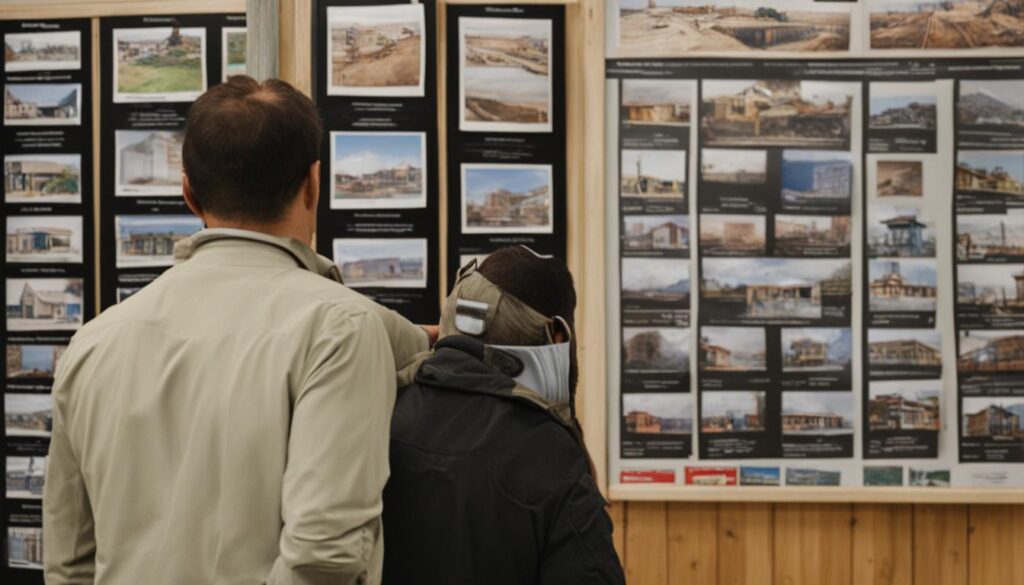
Table: Key Considerations for Choosing a Builder
| Consideration | Description |
|---|---|
| Experience | Assess the builder’s experience and track record in renovations and additions. |
| Sustainability | Choose a builder who understands and prioritizes sustainable building practices. |
| Communication | Ensure that the builder is responsive, transparent, and maintains open lines of communication. |
| References | Check references from past clients to gauge the builder’s reliability and professionalism. |
By taking the time to carefully assess these factors, you can confidently choose a builder who will bring your renovation vision to life. Remember, this is a significant investment in your home, and finding the right builder will ensure that the process is smooth and the end result exceeds your expectations.
Estimating Costs for Renovations
When planning a renovation project, it is crucial for homeowners in Australia to have a clear understanding of the costs involved. Estimating renovation costs allows for effective budget planning and ensures that the project stays on track. Here are some key considerations when estimating costs for renovations:
Factors Affecting Renovation Costs
- Scope of the project: The size and complexity of the renovation will greatly impact costs. Larger projects that involve structural changes or additions will generally be more expensive.
- Materials and finishes: The choice of materials and finishes can significantly affect the overall cost. High-end materials and luxury finishes will generally result in a higher budget.
- Labour costs: The cost of hiring tradespeople and professionals, such as builders, plumbers, electricians, and designers, should be factored into the budget.
- Unforeseen contingencies: It is important to set aside funds for unexpected issues that may arise during the renovation process. Unforeseen contingencies can include hidden structural problems, changes in design plans, or unforeseen building regulations.
By considering these factors and conducting thorough research, homeowners can develop a realistic estimate of the costs involved in their renovation project.
Quote: “Estimating renovation costs accurately is essential for effective budget planning and project management.” – Home Renovation Experts
| Renovation Item | Estimated Cost Range |
|---|---|
| Kitchen Renovation | $10,000 – $30,000+ |
| Bathroom Renovation | $5,000 – $20,000+ |
| Room Extension | $20,000 – $100,000+ |
| Flooring Replacement | $3,000 – $15,000+ |
| Painting | $1,000 – $5,000+ |
Please note that the cost ranges provided above are estimates and can vary depending on various factors including location, size of the room, choice of materials, and the extent of the renovation. It is recommended to consult with professionals and obtain multiple quotes to get a more accurate estimate for your specific renovation project.

Estimating renovation costs accurately is essential for effective budget planning and project management. By considering factors such as the scope of the project, materials and finishes, labour costs, and unforeseen contingencies, homeowners can develop a realistic estimate of the costs involved. It is also important to obtain multiple quotes from professionals and consult with experts to ensure an accurate budget. Remember, proper cost estimation helps homeowners stay within their financial means and achieve their desired renovation goals.
Table: Estimated Cost Range for Common Renovation Items
| Renovation Item | Estimated Cost Range |
|---|---|
| Kitchen Renovation | $10,000 – $30,000+ |
| Bathroom Renovation | $5,000 – $20,000+ |
| Room Extension | $20,000 – $100,000+ |
| Flooring Replacement | $3,000 – $15,000+ |
| Painting | $1,000 – $5,000+ |
Signing a Building Contract
When undertaking a renovation project in Australia, it is crucial to have a legally binding agreement between homeowners and their chosen builder. A building contract outlines various aspects of the project, providing clarity and protection for both parties involved. It is essential to understand the importance of a building contract and ensure that it reflects the agreed-upon sustainability goals and includes detailed plans and specifications.
Signing a building contract establishes critical terms and conditions that govern the renovation project. It outlines the timeframe for completion, ensuring that both parties have a clear understanding of project milestones and deadlines. Additionally, the contract should include provisions for environmental performance outcomes, specifying the use of sustainable materials and energy-efficient practices.
“A building contract is like a roadmap for your renovation project. It sets expectations, protects your rights, and ensures that the work is carried out according to agreed-upon standards.”
When entering into a building contract, it is crucial to thoroughly review its contents and seek legal advice if necessary. Homeowners should ensure that the contract accurately reflects the scope of work, including any variations or additional items discussed during the design phase. By carefully reviewing and signing a building contract, homeowners can minimize the risk of disputes and ensure a successful renovation project.

| Key Elements of a Building Contract | Importance |
|---|---|
| Project Scope | Clearly defines the work to be done, minimizing misunderstandings. |
| Timeframes | Establishes project milestones and deadlines, ensuring efficient progress. |
| Environmental Performance Outcomes | Promotes the use of sustainable materials and energy-efficient practices. |
| Payment Terms | Provides clarity regarding progress payments and final payment amounts. |
| Dispute Resolution Mechanisms | Outlines procedures for resolving disputes, protecting the rights of both parties. |
A building contract serves as a critical tool in managing and executing a successful renovation project. It provides homeowners with peace of mind, protects their rights, and ensures that the work is carried out according to agreed-upon standards. By understanding and adhering to the terms of a building contract, homeowners can navigate the renovation process with confidence and achieve their desired sustainability goals.
Project Management for Renovations
Effective project management is crucial for the successful execution of renovation projects in Australia. From coordinating tradespeople to ensuring compliance with building regulations, a well-managed project helps homeowners achieve their desired outcomes efficiently and cost-effectively.
One of the first steps in project management is appointing a project supervisor who will oversee the renovation process. The project supervisor should have a clear understanding of the project’s scope and requirements, as well as knowledge of sustainable practices. Their role involves coordinating different tradespeople, scheduling tasks, and ensuring that the project stays on track.
Regular communication is key to successful project management. The project supervisor should maintain open lines of communication with both the homeowners and the tradespeople involved in the renovation. This facilitates problem-solving, allows for any necessary adjustments to the plan, and ensures that everyone is on the same page.
Additionally, project management involves addressing various logistical considerations. This may include determining site access, establishing working hours, and ensuring the safety of all individuals involved. By addressing these factors upfront, potential disruptions and delays can be minimized, making the renovation process more efficient.
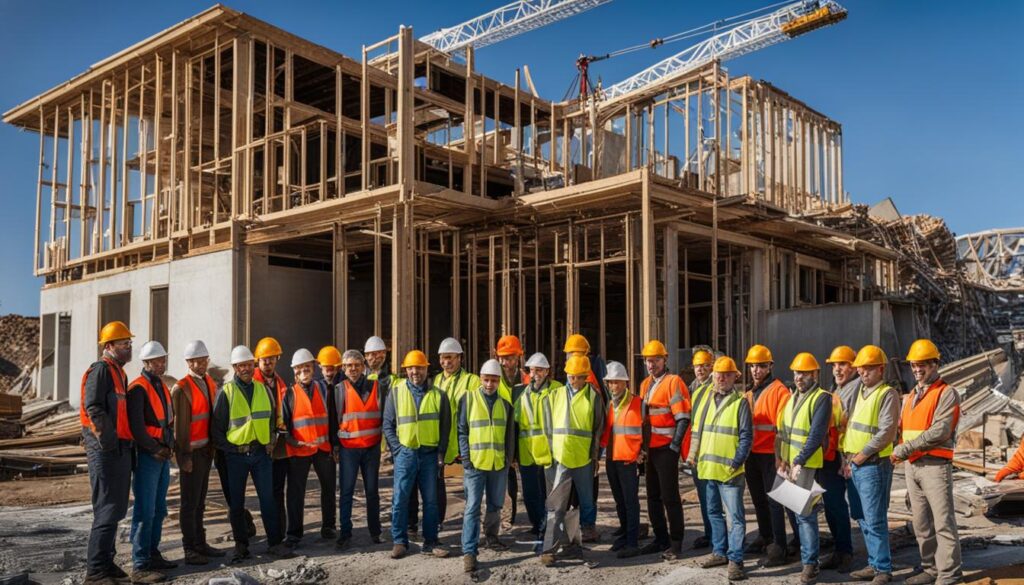
Assessing and Improving Home Functionality
When it comes to renovating our homes, one of the key factors we should consider is functionality. A functional home is one that meets our needs, caters to our lifestyle, and enhances our overall comfort. By assessing our home’s current functionality, we can identify areas for improvement and make targeted renovations that will truly enhance our living spaces.
One way to assess home functionality is by conducting a SWOT analysis, which stands for strengths, weaknesses, opportunities, and threats. This analysis allows us to evaluate what is currently working well in our home (strengths), areas that may need improvement (weaknesses), potential for enhancing functionality (opportunities), and external factors that could impact our renovation plans (threats).
During the assessment process, we should consider various aspects of our home, such as the layout, storage solutions, flow between rooms, and accessibility. Are there any rooms that are underutilized or not fulfilling their purpose? Are there any areas that feel cramped or lacking in storage? Identifying these challenges will help us prioritize our renovation efforts and make informed decisions about where to allocate our resources.
| Strengths | Weaknesses | Opportunities | Threats |
|---|---|---|---|
| We have a spacious living area. | Our kitchen lacks counter space. | Converting the attic into a home office. | Limited budget for renovations. |
| We have ample natural light in the bedrooms. | The bathroom layout is inefficient. | Expanding the outdoor entertaining area. | Potential restrictions due to heritage status. |
| The backyard has potential for landscaping. | The laundry area is too small. | Creating a dedicated playroom for the kids. | Potential noise from nearby construction. |
Based on the assessment, we can start planning our renovations to improve functionality. This could involve reconfiguring the layout of certain rooms, adding built-in storage solutions, or creating multi-purpose spaces. By focusing on improving functionality, we can transform our homes into spaces that truly work for us and enhance our day-to-day living experience.
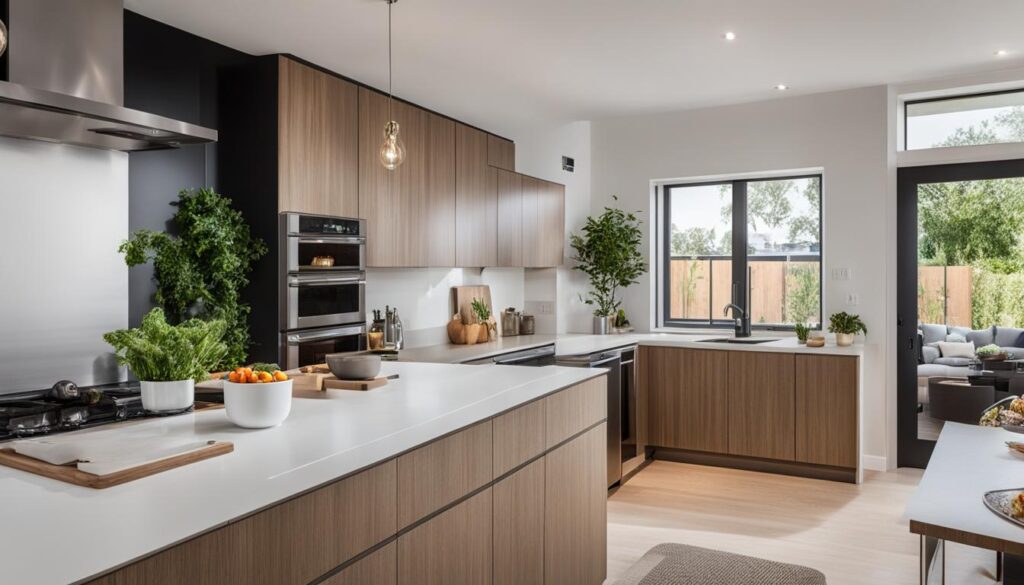
Remember, renovating for functionality is not just about aesthetics; it’s about creating spaces that support our lifestyle and make our daily routines more efficient. So, before diving into a renovation project, take the time to assess your home’s current functionality, identify areas for improvement, and plan your renovations accordingly. By doing so, you’ll not only enhance the livability of your home but also increase its value and appeal in the long run.
Expert Services for Energy Efficiency Assessments
When it comes to renovating your home with energy efficiency in mind, seeking expert services for energy efficiency assessments is crucial. These professionals can provide valuable insights and recommendations to help you make informed decisions and maximize your home’s energy efficiency potential.
Accredited energy assessors are trained to conduct thorough audits and assessments of your home’s energy usage. They can identify areas of improvement and suggest cost-effective measures to reduce energy consumption and increase efficiency. Whether it’s upgrading insulation, improving ventilation systems, or installing energy-efficient appliances, their recommendations can significantly impact your home’s overall energy performance.
“Engaging an accredited energy assessor can help homeowners uncover energy-saving opportunities that they might have overlooked. Their in-depth knowledge and expertise allow them to provide tailored recommendations that align with your goals and budget.” – Sustainable Homes Australia
In addition to energy assessors, architects and designers specialized in sustainability can also play a crucial role in your renovation project. They can provide advice on building orientation, material selection, and design features that optimize energy efficiency. By incorporating their expertise from the early stages of your renovation, you can ensure that your home is designed and built with sustainability in mind.
Benefits of Expert Energy Efficiency Assessments
- Identify energy-saving opportunities
- Maximize energy efficiency potential
- Incorporate sustainable design features
- Ensure compliance with energy efficiency regulations
Whether you’re renovating your entire home or focusing on specific areas, consulting with experts in energy efficiency assessments can provide you with the knowledge and guidance needed to achieve your sustainability goals. Their expertise can help you create an energy-efficient and environmentally-friendly home that not only reduces your carbon footprint but also saves you money in the long run.

| Energy Efficiency Measure | Potential Savings |
|---|---|
| Solar Panel Installation | Up to 30% reduction in electricity bills |
| LED Lighting Upgrade | Up to 80% energy savings |
| Insulation Improvement | Up to 20% reduction in heating and cooling costs |
| Appliance Replacement with Energy Star-rated models | Up to 30% energy savings |
Conclusion
In conclusion, the renovation industry in Australia is currently experiencing a significant boom, with homeowners actively investing in interior room upgrades. Kitchens, guest bedrooms, guest bathrooms, entry/mudrooms, and wardrobes are the most popular spaces being renovated to create functional and visually appealing areas within homes.
Energy efficiency is also a top priority for many homeowners undertaking renovations. Simple measures like sealing draughts, installing water-efficient showerheads, and upgrading to energy-efficient appliances can make a significant difference. More extensive changes such as improving insulation, upgrading windows, and incorporating thermal mass through flooring choices further enhance energy efficiency.
To ensure successful renovation projects, it is important for homeowners to follow the established renovation process, choose the right builder, and estimate costs accurately. Seeking expert advice from professionals such as energy assessors, architects, and designers specialized in sustainability can greatly assist in achieving desired outcomes.
By conducting thorough assessments, considering home functionality, and implementing energy efficiency improvements, homeowners can transform their homes into more comfortable, sustainable, and efficient spaces. With the right planning, execution, and expert guidance, renovations in Australia have the potential to enhance both the value and livability of homes.
FAQ
What is the current trend in renovations in Australia?
The current trend in renovations in Australia is focused on interior room upgrades, with kitchens being the most popular room to upgrade.
Are homeowners in Australia prioritizing energy efficiency in their renovation projects?
Yes, homeowners in Australia are placing an emphasis on energy efficiency during renovations, with measures such as sealing draughts and installing energy-efficient appliances.
How can homeowners estimate the costs of their renovation projects?
Homeowners can estimate the costs of their renovation projects by conducting thorough research and obtaining preliminary cost estimates for each stage of the renovation.
What should homeowners consider when choosing a builder for their renovation project?
When choosing a builder for a renovation project, homeowners should consider the builder’s experience and track record, specifically in renovations and additions.
What is the importance of a building contract in a renovation project?
A building contract is a crucial legal agreement that outlines various aspects of the renovation project, such as timeframes, environmental performance outcomes, and insurance.
How can homeowners effectively manage their renovation projects?
Homeowners can effectively manage their renovation projects by appointing a project supervisor who understands the scope and requirements of the renovation, and regularly communicating and overseeing the project.
How can homeowners assess and improve the functionality of their homes during renovations?
Homeowners can assess and improve the functionality of their homes during renovations by conducting a SWOT analysis (strengths, weaknesses, opportunities, threats) and making cost-effective improvements based on the analysis.
What expert services are available for energy efficiency assessments during renovations?
Homeowners can engage professionals for energy audits and assessments to receive detailed reports on energy usage and obtain recommendations on cost-effective energy efficiency measures.

